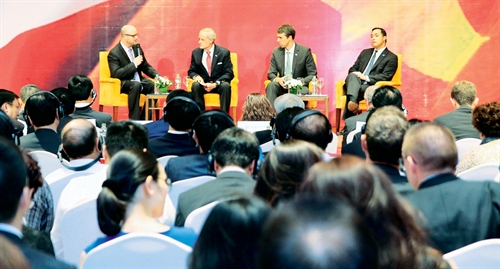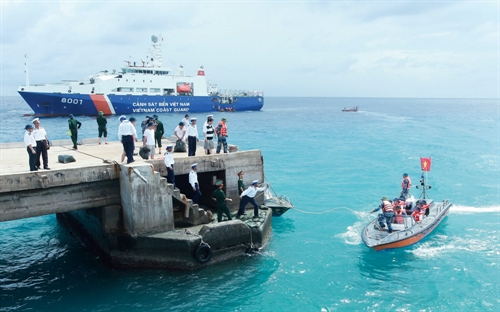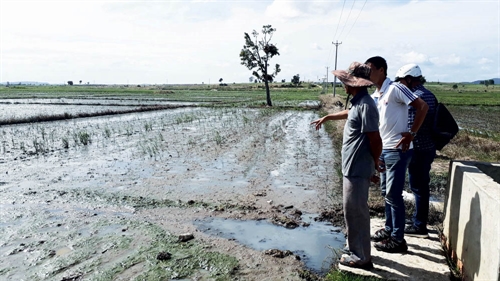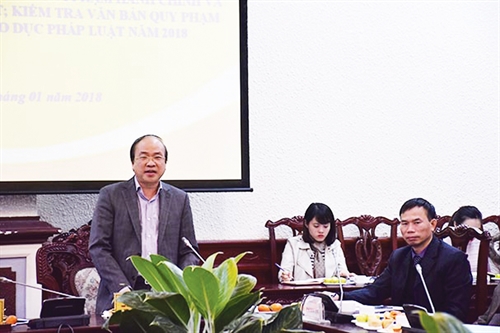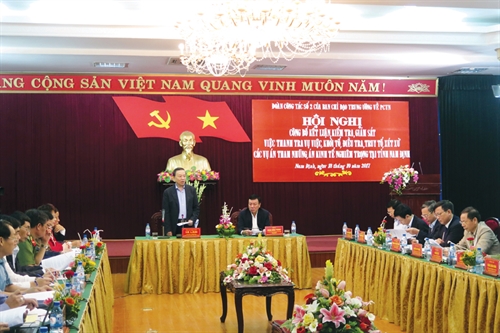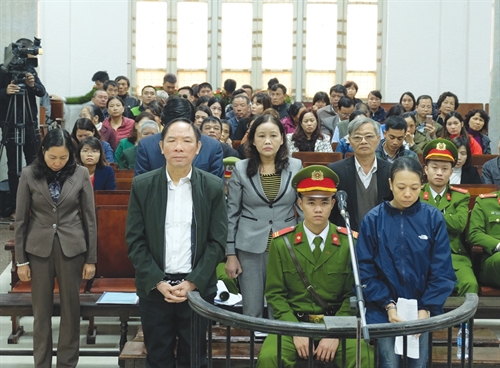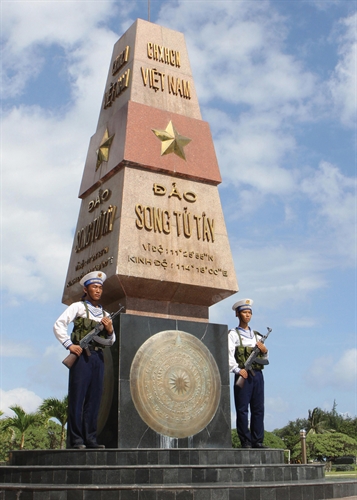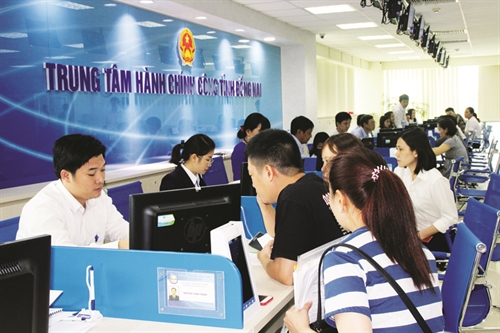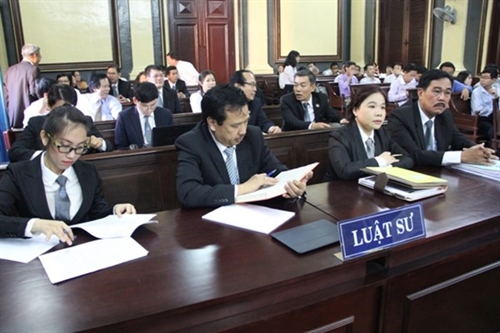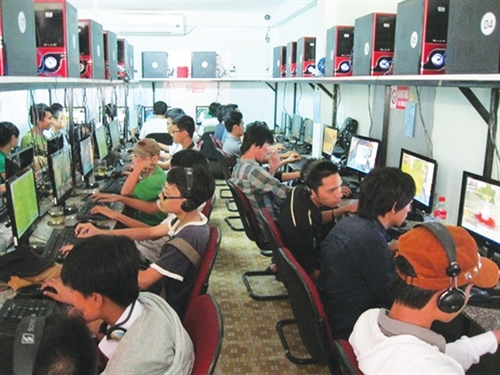Pham Thi Hang, LL.M.
Department of Legal Affairs and Science Management
Supreme People’s Court
Settlement of commercial disputes through arbitration is an international practice that is applied by many countries worldwide thanks to its flexibility and efficiency. The recognition and enforcement of foreign arbitral awards help enforce arbitral awards and avoid double trial of the same case. The procedures for recognition and enforcement of foreign arbitral awards are provided in legal documents of Vietnam and relevant treaties. However, in Vietnam the implementation of regulations on these procedures shows not a few problems.
Treaties and domestic laws on recognition of foreign arbitral awards
So far, Vietnam has signed bilateral agreements on mutual legal assistance that contain provisions on the recognition and enforcement of foreign arbitral awards with 14 countries, including the Russian Federation, Czech Republic, Slovakia, France, Poland, China and France, among others.
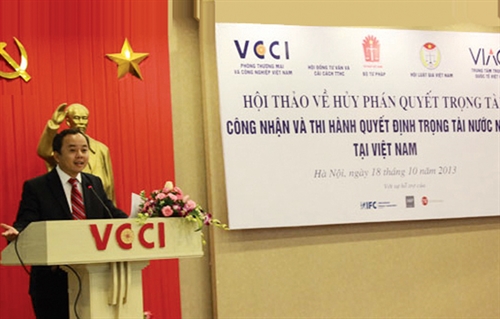 |
| A VIAC arbitrator addresses the workshop on setting aside of arbitral awards, recognition and enforcement of foreign arbitral awards in Vietnam__Photo: Internet |
The 1958 Convention on the Recognition and Enforcement of Foreign Arbitral Awards, also known as the New York Convention, has 157 member states[1]. It was ratified by Vietnam in September 1995 and entered into force in the country three months later. Most countries worldwide apply this Convention to the recognition and enforcement of foreign arbitral awards. The agreements on mutual legal assistance recently signed by Vietnam with Russia, China and France also stipulate that the recognition and enforcement of foreign arbitral awards comply with this Convention.
Acceding to this Convention, Vietnam has made three reservations.
First, Vietnam will apply the Convention to the recognition and enforcement of arbitral awards made only in the territory of another contracting state. With respect to arbitral awards made in the territories of non-contracting states, it will apply the Convention on the basis of reciprocity.
Second, Vietnam will apply the Convention only to differences arising out of legal relationships which are considered commercial under the laws of Vietnam.
Third, interpretation of the Convention before the court or other competent authorities of Vietnam must be made in accordance with the Constitution and law of Vietnam.
Regarding domestic legislation, the first legal text regulating the recognition and enforcement of arbitral awards is the Ordinance on the Recognition and Enforcement of Foreign Arbitral Awards in Vietnam enacted in 1995. This Ordinance touched upon such issues as foreign arbitral awards that may be recognized and enforced; principles of recognition and enforcement; and order and procedures for considering requests for recognition and enforcement of foreign arbitral awards in Vietnam. Other matters include the right to make appeals or protests; fees for recognition and enforcement; and guaranteeing the transfer of money and assets for enforcement.
In 2004, the Civil Procedure Code was enacted, containing provisions on the recognition and enforcement of arbitral awards which were developed from those of the above Ordinance. This Code was revised in 2011.
Later, in 2015, a new Civil Procedure Code was passed to replace the 2004 Code and its 2011 amendments. The procedures for the recognition and enforcement of foreign arbitral awards are provided in two chapters of Part VII of the Code in conformity with the New York Convention and relevant treaties. Specifically, Chapter 35 contains general provisions on the procedures for recognition and enforcement or non-recognition of judgments and rulings of foreign courts; and recognition and enforcement of foreign arbitral awards. Chapter 37 specifies the procedures for considering requests for recognition and enforcement of foreign arbitral awards in Vietnam.
Other legal documents dealing with recognition and enforcement of foreign arbitral awards include the 2010 Law on Commercial Arbitration, the 2005 Commercial Law, the 2014 Law on Investment and implementing regulations, and regulations on court fees.
Settlement of requests for recognition of foreign arbitral awards
According to statistics of the Supreme People’s Court, over nearly 10 years of implementation of the 2004 Civil Procedure Code, provincial-level People’s Courts nationwide received 53 requests for recognition and enforcement of foreign arbitral awards. Of which, 23 awards were recognized and enforced (43.4 percent), 25 not recognized (47.2 percent), two requests suspended from settlement (3.8 percent), and three still in the process of settlement (see Table 1). The rate of foreign arbitral awards recognized and permitted for enforcement in Vietnam was very low compared to other countries, e.g., 100 percent in Japan, 98 percent in Britain, and 90 percent in the US.
Table 1: Settlement of requests for recognition of foreign arbitral awards between early 2005 and mid-2014[2]
| No. | Provincial court settling applications | Number of requests | Number of awards not recognized | Rate of non-recognized awards to the number of requests | Number of awards recognized and permitted for enforcement | Number of requests suspended from settlement | Number of requests currently settled |
| 1 | Ho Chi Minh City | 21 | 5 | 24% | 16 | 0 | 0 |
| 2 | Hanoi | 11 | 9 | 82% | 1 | 1 | 0 |
| 3 | Can Tho city | 1 | 0 | 0% | 1 | 0 | 0 |
| 4 | An Giang province | 1 | 0 | 0% | 1 | 0 | 0 |
| 5 | Long An | 2 | 2 | 100% | 0 | 0 | 0 |
| 6 | Hung Yen | 2 | 2 | 100% | 0 | 0 | 0 |
| 7 | Nam Dinh | 3 | 1 | 33% | 0 | 0 | 2 |
| 8 | Ha Nam | 1 | 0 | 0% | 0 | 0 | 1 |
| 9 | Dong Nai | 1 | 0 | 0% | 1 | 0 | 0 |
| 10 | Ba Ria-Vung Tau | 1 | 0 | 0% | 1 | 0 | 0 |
| 11 | Thai Binh | 2 | 2 | 100% | 0 | 0 | 0 |
| 12 | Binh Thuan | 1 | 0 | 0% | 0 | 1 | 0 |
| 13 | Phu Tho | 2 | 0 | 0% | 2 | 0 | 0 |
| 14 | Binh Duong | 4 | 4 | 100% | 0 | 0 | 0 |
| Total | 53 | 25 | 47.2% | 23 | 2 | 3 |
Table 1 shows that the number of requests for recognition and enforcement of foreign arbitral awards in Vietnam remained modest (just 53 requests over 10 years) while the rate of non-recognized awards was high (47.2 percent).
The number of requests was uneven from year to year, which saw a rise from 2012 to 2014, and a sharp drop since 2015 (see Table 2).
Table 2: Settlement of applications for recognition of foreign arbitral awards from 2010 to June 2017[3]
| Year | Number of requests accepted | Number of requests suspended from settlement or transferred | Number of recognized agreements of involved parties | Number of requests settled | Number of requests unsettled |
| 2010 | 3 | 0 | 0 | 3 | 0 |
| 2011 | 2 | 0 | 0 | 0 | 2 |
| 2012 | 16 | 1 | 4 | 10 | 1 |
| 2013 | 27 | 2 | 0 | 17 | 8 |
| 2014 | 14 | 2 | 0 | 11 | 1 |
| 2015 | 5 | 1 | 0 | 2 | 2 |
| 2016 | 11 | 3 | 0 | 2 | 6 |
| First half of 2017 | 6 | 0 | 1 | 1 | 4 |
| Total | 84 | 9 | 5 | 46 | 24 |
Regarding the number of foreign arbitral awards not recognized and enforced, we can see that the court often based itself on Article 370 of the 2004 Code to reject a request.
The first base is the incompetence of the signatories to an arbitration agreement under the law applicable to each party under Article 370.1.a of the 2004 Code (replaced with Article 459.1.a of the 2015 Code).
In the court rulings rejecting requests for recognition and enforcement of foreign arbitral awards for the reason that the signatory to an arbitration agreement is incompetent to do so, it can be seen that in many cases Vietnamese legal persons that signed arbitration agreements were considered doing so ultra vires. For instance, the people’s court of province B refused to accept the request filed by Company DHN for recognition and enforcement of a foreign arbitral award on the ground that the signatory to the arbitration agreement had no capability to do so. Specifically, the director general of this company signed the contract with a value exceeding the level he was authorized to decide, namely surpassing 30 percent of the company’s charter capital, because under the decision of the chairperson of the company’s Board of Directors regarding decentralization and authorization, the director general of the company may not sign contracts with a value exceeding 30 percent of the company’s charter capital.
The second base is that the judgment debtor was not promptly and properly notified of the appointment of arbitrators and procedures for settlement of disputes at foreign arbitrations under Article 370.1.c of the 2004 Code, superseded by Article 459.1.c.
In the course of signing and performing a commercial contract, the judgment debtor (the Vietnamese side) often used two email addresses for contact, including the email of the legal person and the email of the enterprise’s employee - the contact person. However, the relevant notices and documents sent by the Arbitration Council settling disputes did not reach the judgment debtor. The court holds that, in this case, the judgment debtor was not promptly and properly notified of the procedures for settlement of the dispute at the foreign arbitration and this is used as a basis for it to reject the request for recognition and enforcement of the foreign arbitral award.
The third ground is that the recognition and enforcement of foreign arbitral awards contravenes the basic principles of Vietnam’s law under Article 370.2.b of the 2004 Code, replaced with Article 459.2.b of the 2015 Code.
Studying the court rulings not recognizing foreign arbitral awards, we find out that the court applies this ground in two cases: (i) violation of the provisions of substantive law and the law applicable in the settlement of contractual disputes is considered breaching the basic principles of Vietnam’s law. In a case, the court ruling even invoked the violation of law-guiding decrees and circulars as a breach of the basic principles. This led to the fact that the court had to review the dispute already settled by the arbitration; and (ii) violation of Vietnam’s law is regarded as contravening the basic principles of Vietnam’s law, including violation of other grounds for non-recognition of foreign arbitral awards.
Recommendations for consistent implementation of regulations on recognition of foreign arbitral awards
In our opinion, competent authorities should issue instructions for the consistent implementation of the 2015 Code’s provisions on procedures for recognition and enforcement of foreign arbitral awards.
Burden of proof
The judgment debtor’s burden of proof in case it objects the judgment creditor’s request is stated in Article 459.1: “The court shall not recognize a foreign arbitral award if seeing that the evidence provided by the judgment debtor to object the requested recognition of the award is grounded and lawful and the award falls into one of the following cases…” Specific guidelines are need to make clear that the court will not consider by itself these cases unless the party objecting the enforcement of the award can provide grounded and lawful evidence of its objection. The court will neither collect evidence nor request the recognition-requesting party to provide evidence in order to reject the objection of the judgment debtor.
Competence to sign arbitration agreements
Detailed guidance is also needed for the consistent implementation of the provisions of Article 459.1.a regarding cases in which the signatories to an arbitration agreement are incapable of signing this agreement under the law applicable to each party, especially in case a civil transaction established by an incompetent person or established ultra vires is still legally valid under Articles 142.1 and 143.1 of the 2015 Code. Clear guidance is also required regarding which law is applicable in order to consider the competence of the parties to sign arbitration agreements; otherwise the Vietnamese court will automatically apply Vietnamese law to determine the foreign partner’s capability to sign arbitration agreements.
Notification of appointment of arbitrators
The phrase “promptly and properly notified” used in Article 459.1.c needs detailed guidelines to deal with the case in which the arbitration that settles a dispute fails to send a notice or sends it not to the address of the judgment debtor. Once the judgment debtor is not notified of the appointment of an arbitrator and procedures for settlement of the dispute at the arbitration, it is impossible to select an arbitrator. Such guidelines should state that if the notice cannot reach the judgment debtor due to his fault, he will not be regarded as not having been promptly and properly notified of the appointment of arbitrators and procedures for settlement of disputes at foreign arbitrations.
Places for receiving requests for recognition of foreign arbitral awards
Article 451’s provisions on places for receiving requests and accompanying papers should be specified as the agreements on mutual legal assistance between Vietnam and North Korea, Russia and Hungary do not state the body to receive such requests. Whether a requester can lodge his request for recognition and enforcement of foreign arbitral awards directly with the competent court? Or, as other agreements assign the Ministry of Justice to receive requests, in case an a requester files his request with the court, how would the court deal with this case? In this case, it is suggested that as the body directly settling the case, the court should be allowed to receive the request and notify it to the Ministry of Justice.
Review of rulings of superior people’ courts
Article 462.6 provides that the procedures for reviewing rulings of superior people’s courts regarding the settlement of requests for recognition and enforcement of foreign arbitral awards in Vietnam are those applicable to the settlement of civil cases. In our view, specific guidelines are also needed to ensure proper application of these procedures.-
